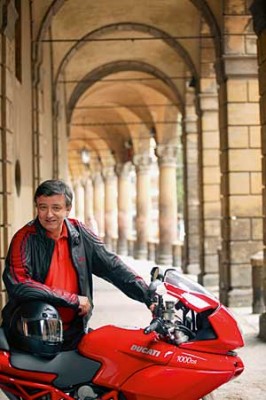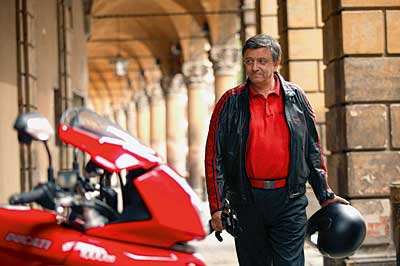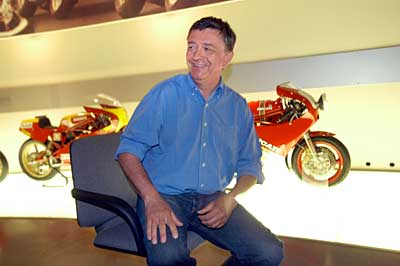Federico Minoli – A shaman who dreams in red
Federico Minoli, president and CEO of Ducati Motor Holding, may be the only shaman born in Gallarate, Italy.
Gallarate is a grey provincial town about 30 kilometres north of Milan, not a customary birthplace for high priests who – by definition – use magic for the purpose of curing the sick, divining the hidden and controlling events.
But Federico Minoli, currently president and CEO of Ducati Motor Holding, SpA, is not your everyday shaman. The sick patients he heals are not individuals, but rather companies, and his divining consists of recognizing hidden assets in under-performing businesses.
At Ducati, his tribe consists of employees, shareholders and millions of passionate “Ducatisti” around the world. His mantra is: “We are not about motorcycles; we are about motorcycling.”
Minoli’s education was devoid of mysticism. He attended a science-oriented high school in Gallarate and then went on to the University of Pavia in 1968, where he focused politics rather than his studies.
The inner call was triggered in 1967 when Minoli was still in high school.
“I had the opportunity to go on a National Youth Exchange to San Francisco through the local Lions Club,” he recalls.
“I had never travelled so far from Gallarate and this had a major impact on me.”
His English became so good and his identification with the United States so strong that the Italian press – even now – sometimes mistakes him for an American. He has an American wife and two bicultural children, one born in each country, and he favours blue jeans and casual shirts when working in his office at Ducati headquarters.
Back in 1973, when Minoli graduated from university, his understanding of American culture and language helped him land a job with Procter & Gamble in Rome. During his three years with P & G, he travelled back and forth frequently between the US and Italy. “My life has been like that ever since,” he reflects, “back and forth between the two countries, between management and consulting positions, between working and sabbaticals.”
The day he was named a product manager for P & G, in record time for a non-American, Minoli announced his resignation. He spent the next six months travelling around the US, a’ la Jack Kerouac, then went to work for Playtex International and spent five more years between Italy and the US. Then it was time for an additional change – a six-month sabbatical in South America and Africa.
The next challenge was management consulting, working with Gianfilippo Cuneo, an esteemed Italian business strategist then at McKinsey. “I hated it from day one,” admits Minoli. “I just couldn’t understand the logic of consulting.” After three months he was ready to quit, but Cuneo wasn’t ready to give up. “He improvised a special arrangement for me,” Minoli explains. “I would be an outside consultant to them. He gave me all the unorthodox clients that no one else wanted.”
Through this arrangement, Minoli absorbed unorthodox lessons in business from (among others) the Aga Khan, developing a world-class resort in Sardinia with his own sense of time and space, and from Luciano Benetton, a marketing genius who, in Minoli’s words, succeeded by doing the opposite of what common sense dictated. Minoli’s management philosophy took shape.
“I decided that being a consultant is boring after a while. You work with your brain but have atrophy of your heart and hands and passion. In a company, you work with your heart and hands but not your brain. You are obsessed with the day-to-day and don’t have time to think. I wanted to move back and forth between these two worlds so I could develop all three.”
The opportunity to do that came with Minoli’s next challenge – in private equity. He moved with his wife to the US, to Boston, to work for Bain Consulting, but he was restless. “Across the hall was Bain Capital, so I went over and said, ‘Why don’t you use my skills?’ I thought my interests could be put to use with private equity funds, because you need analytical skills for the due diligence and management skills for the operation.”
He readily admits that luck is a factor in corporate turnarounds. “In addition to having a plan and implementing it quickly, you need luck,” he maintains.
Luck was with Minoli when he was introduced to Texas Pacific Group, a client of Bain Consulting. TPG was evaluating an Italian company named Ducati, and Minoli was Italian, so he was asked to handle the group’s pre-acquisition due diligence.
“When you take over a company you have a 100-day honeymoon to show people what you can do,” he emphasizes. “If you don’t prove yourself then, you won’t succeed. So there is an advantage in having done the due diligence beforehand; you already know what to do. My plan was to take Ducati from metal mechanics to enter-tainment, from motorcycles to motorcycling.”
Minoli saw his initial challenge as getting his employees to work together for the “new” Ducati. The first thing he did was build a Ducati museum on the main floor of corporate headquarters. Although there was a leak in the factory roof, the museum took priority. “That sent a clear message,” he recalls.
He brought in new blood to work with the engineers who had been quality-oriented but out of touch with consumers, and he built a rich Web site (www.ducati.com) that receives 8 million visitors a year.
To make sure that everyone “sees red,” every employee is expected to learn how to ride a motorcycle; there are incentives for buying a Ducati motorcycle, and everyone who comes to work on a Ducati has privileged parking, regardless of title.
“Now we have a team,” notes Minoli. “We speak a common language. Everyone is part of our tribe.”
Restless as ever, Minoli left Ducati in 2000 after four years at the throttle, retaining the title of president but yielding CEO responsibilities. Company performance faltered in an overall weak market, and TPG summoned him back in 2003. In the first quarter of 2004, revenues were up 23.4 percent over the same period in 2003. Minoli’s magic touch has not deserted him.
“I think of myself as a shaman, an agitator,” he says, with a conviction that has charmed Wall Street brokers as well as weekend bikers. “Shamans dream of building communities. The challenge for Ducati is to convert this ‘share of dream’ – the desire to be part of the World of Ducati – into share of market by building sales at the dealer level.”




